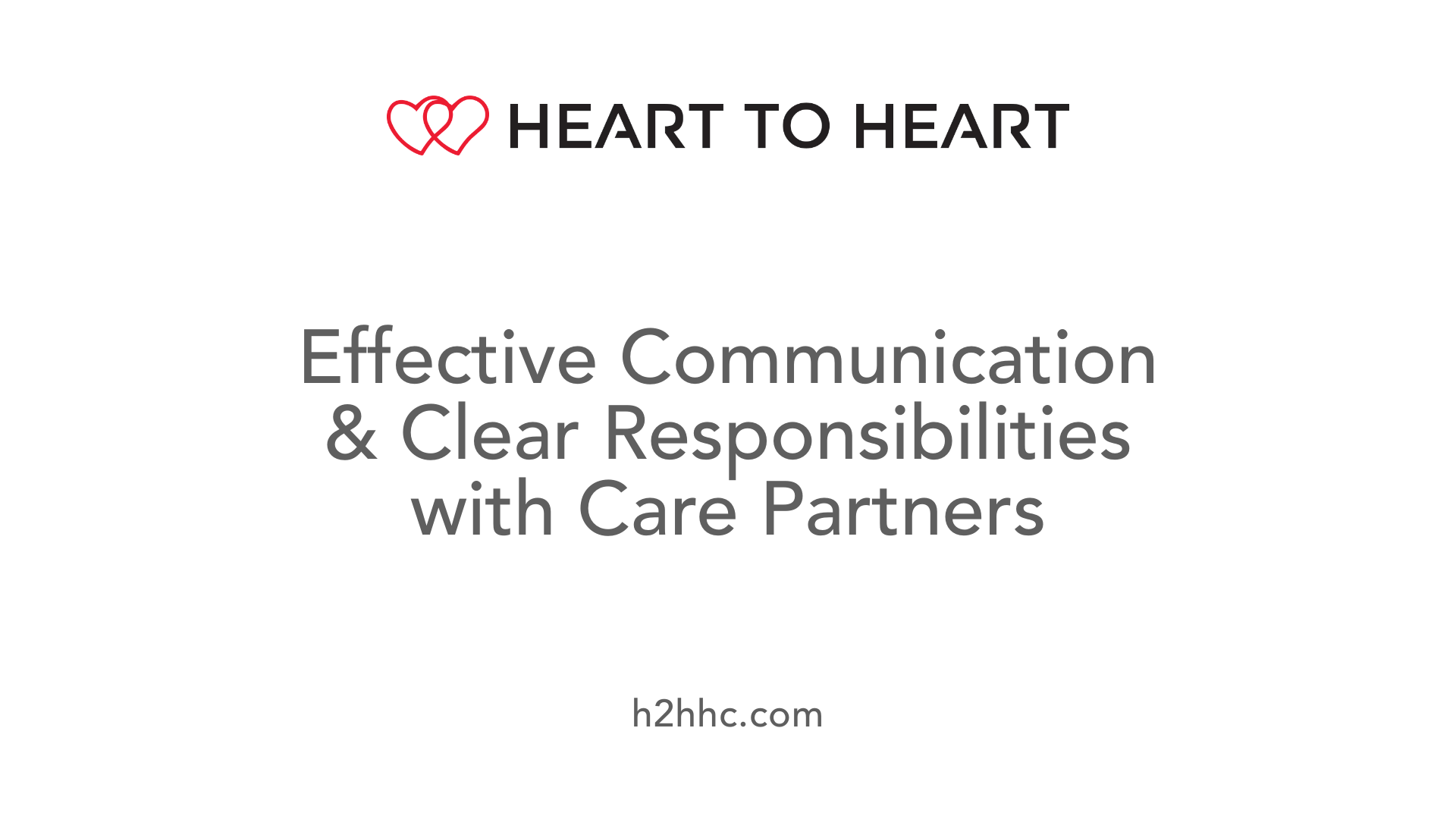Strategic Approaches to Harmonizing Caregiving and Work Commitments
May 22, 2025

Balancing family caregiving responsibilities with professional home care support is a delicate task that requires careful planning, effective communication, and utilization of resources. As many caregivers juggle employment, household duties, and caregiving, this article explores practical strategies, available services, and emotional support mechanisms to help maintain this vital balance. It emphasizes that proactive measures and community resources can significantly mitigate stress, prevent burnout, and ensure quality care for loved ones while sustaining professional commitments.

Maintaining a healthy balance between caregiving responsibilities and personal or professional life is crucial for caregivers. One effective strategy is to develop detailed care plans that clearly outline daily tasks, prioritize needs, and assign specific times for activities. This organized approach helps prevent caregiving from becoming overwhelming and ensures that important responsibilities are addressed systematically.
Setting realistic boundaries is equally important. Caregivers should define what they can and cannot do, establishing limits to protect their personal time and reduce stress. For example, they might allocate certain hours solely for work or personal activities, and communicate these boundaries with family members and employers.
Utilizing available support resources can significantly ease the burden. Flexible work arrangements such as telecommuting, part-time hours, or job sharing can offer much-needed flexibility. Family and friends can assist with routine tasks or provide emotional support, while support groups offer practical advice and shared experiences.
Prioritizing self-care is essential to sustain caregiving and employment roles. Regular health check-ups, exercise, and mental health practices like mindfulness help maintain physical and emotional well-being. Leveraging technology, like scheduling apps and reminder systems, can streamline caregiving tasks, making them more manageable.
Open communication with employers about caregiving duties can lead to accommodations like flexible schedules or leave options. Building a reliable support network and discussing expectations within the family foster cooperation and reduce misunderstandings.
In summary, establishing a detailed care plan, setting boundaries, and actively seeking support through resources and open dialogue help caregivers balance their multiple roles effectively. These strategies not only improve the quality of care but also protect the caregiver’s health and personal fulfillment.

Family caregivers juggling multiple roles often face significant challenges, but a wide array of community resources and support systems are available to help. Local senior centers, faith organizations, and government agencies provide vital services such as respite care, transportation assistance, and caregiver training programs. These services give caregivers the opportunity to rest, reconnect with personal interests, or handle their own health needs.
National organizations like AARP, Caregiver Action Network, and the National Alliance for Caregiving offer valuable support groups, educational materials, and online forums where caregivers can share experiences and advice. Additionally, programs sponsored by the government, such as the National Family Caregiver Support Program (NFCSP), provide grants and services focused on reducing stress and improving caregiving skills.
Many communities also have practical services like Meals on Wheels, adult day care, and volunteer support programs that help with household chores, companionship, and transportation. These resources are crucial for maintaining a balance between caregiving and personal life.
To navigate this network of services effectively, caregivers can start by mapping out local offerings through resources like the Eldercare Locator or visiting government websites such as Health.gov and USA.gov. Connecting with local senior centers or community health organizations can further facilitate access to tailored programs designed to meet specific needs.
In summary, community-based resources can significantly ease the burden of caregiving, offering emotional, practical, and informational support that enhances the well-being of both caregivers and loved ones.

Caregiving can be both rewarding and challenging, often bringing emotional and physical stress. Recognizing early signs of burnout—such as persistent fatigue, irritability, anxiety, or feelings of hopelessness—is the first step toward maintaining well-being.
To manage stress effectively, caregivers should actively seek support from family, friends, or professional counselors. Asking for help and sharing responsibilities can lighten the load. Establishing healthy boundaries is also crucial; this might mean setting specific times for caregiving tasks and ensuring personal time is protected.
Self-care activities play a vital role. Regular exercise, whether walking, yoga, or other physical activity, helps reduce stress hormones and improve mood. Engaging in hobbies, practicing mindfulness or meditation, and getting sufficient sleep improve emotional resilience.
Connecting with support groups, like those offered by organizations such as the Alzheimer’s Association or Caregiver Action Network, provides emotional relief and a platform to share experiences. Taking advantage of respite care—temporary relief services—allows caregivers to rest and recharge.
Staying organized and setting realistic goals help reduce anxiety. Educating oneself about the specific needs and health conditions of loved ones can also ease caregiving uncertainties. Most importantly, seeking professional help for mental health concerns prevents escalation of stress-related issues.
Balancing these strategies ensures caregivers maintain their health and continue providing compassionate care, creating a more sustainable caregiving experience.
More info: Searching for “Stress management and emotional well-being for family caregivers” can provide additional resources to support caregivers in their journey.

Maintaining a good working relationship with professional caregivers is essential for providing consistent and high-quality care to loved ones. Practical tips start with establishing clear roles and responsibilities early in the caregiving process, ensuring that everyone understands their specific duties.
Setting realistic expectations helps prevent misunderstandings and frustrations. It’s also vital to maintain boundaries that keep interactions professional while fostering trust and mutual respect.
Effective communication plays a crucial role. Regular updates through face-to-face meetings, phone calls, or written reports help keep everyone informed about the care plan and any changes in health status. Active listening and responding with empathy build a respectful environment.
Respecting the privacy of the care recipient and obtaining proper consent for sharing information are essential for ethical and compliant communication practices. Care agencies often recommend working with personalized care plans and thoughtfully matching caregivers to the needs and personality of the individual receiving care.
By nurturing these professional relationships, family members can ensure that care is delivered with compassion, consistency, and understanding, resulting in better outcomes for their loved ones.
Developing structured care routines helps ensure consistency and reduces stress for both the caregiver and the recipient. Documenting responsibilities, such as medication schedules, daily activities, and emergency procedures, provides a clear blueprint for everyone involved.
This documentation also facilitates communication among multiple caregivers and makes transitions smoother if staffing changes occur. It acts as an accountability tool, ensuring that important tasks are completed and that care quality is maintained.
Creating routines and maintaining detailed records enable caregivers to identify what works best and make adjustments over time. They also serve as a safeguard against oversight, helping to coordinate efforts among family members and professional services for comprehensive, coordinated care.
Overall, these strategies create a dependable structure that supports the well-being of the care recipient and reduces caregiver stress.
Providing caregivers with proper training is essential for ensuring the safety and well-being of their loved ones. Evidence-based approaches include offering instructional sessions on managing medications, operating medical equipment, and recognizing health changes. This can be achieved through workshops, online courses, or one-on-one coaching provided by healthcare professionals or home health agencies. Caregivers also benefit from learning practical skills like mobility assistance, hygiene, and nutrition management, which help them perform daily tasks confidently.
Additionally, developing personalized care plans and using technology such as appointment reminders or health monitoring apps can streamline caregiving duties. By equipping caregivers with the right knowledge and tools, they can provide higher quality care while reducing their own stress.
Legal and financial preparations form a vital part of long-term caregiving strategies. Developing documents like powers of attorney, living wills, and advanced care directives ensure that loved ones’ wishes are respected and that authorized individuals can make decisions on their behalf if needed. These legal tools help prevent future conflicts and delays in receiving necessary care.
Financial planning is equally crucial, as caregiving can be costly. Creating a budget, exploring insurance benefits, and understanding available financial assistance programs can ease financial burdens. Organizing all relevant documents and consulting with legal and financial advisors ensures caregivers are prepared for future medical expenses, housing needs, or end-of-life arrangements.
Support for caregivers must include proactive, evidence-based practices to prevent burnout. Connecting caregivers with community resources such as support groups, respite care, and home health services offers essential relief. Education about the specific health conditions they are managing boosts confidence and reduces anxiety.
Self-care routines like regular exercise, balanced nutrition, sufficient sleep, and stress management techniques—such as meditation or deep breathing—are proven to improve well-being. Caregivers are encouraged to set realistic goals, delegate responsibilities, and seek emotional support when needed.
Routine assessments by healthcare providers can identify signs of stress or burnout early, allowing for timely intervention. By fostering a strong support network and emphasizing self-care, caregivers can maintain their health and continue providing effective care.
Balancing caregiving duties with a professional career can be challenging, but effective strategies can make it manageable. First, caregivers should focus on good time management—this includes creating a daily or weekly schedule that dedicates specific times for caregiving activities and work tasks.
Flexible work arrangements are also crucial. If possible, caregivers can request options like telecommuting, adjustable hours, or part-time work from their employers. Open communication is essential; discussing caregiving needs with employers and family members ensures everyone understands responsibilities and expectations.
Utilizing community resources and professional services can significantly ease the burden. Support programs such as respite care provide temporary relief, allowing caregivers to rest and recharge. Additionally, engaging professional home care services for assistance with transportation, meal preparation, light housekeeping, or specialized care like Alzheimer’s support, can free up time and reduce stress.
Prioritizing self-care is equally important. Regularly assessing physical and emotional health, seeking emotional support through counseling or support groups, and taking regular breaks can prevent burnout. Planning ahead, maintaining clear boundaries, and leveraging available support systems are vital to creating a sustainable caregiving routine that balances both personal and professional responsibilities.
Successfully balancing family caregiving responsibilities with professional home care support is achievable through strategic planning, effective communication, and utilizing available resources. Building a dependable support network, embracing community resources, and prioritizing self-care are vital to maintain emotional and physical well-being. Family caregivers should engage in ongoing education, develop adaptable care strategies, and work closely with professional caregivers to ensure seamless and high-quality care. With proactive measures and community engagement, caregivers can manage their dual roles effectively, ensuring the well-being of their loved ones while sustaining their own health and career.
09:00 AM - 06:00 PM
Monday - Friday
2488 Grand Concourse Suite 409, Bronx, NY, 10458
T: 718-305-5858
F: 718-305-6258
1 Smith Street, 3rd Floor, Brooklyn, New York, 11201
T: 718-305-5959
F: 718-305-6259
2361 Nostrand Ave Suite 401 Brooklyn, NY 11210.
T: 718-305-6060
F: 718-305-6260
576 Central Ave # 301, East Orange, NJ 07018
433 Woodbury Glassboro Road Sewell, NJ 08080
1172 Fischer Blvd, Toms River, NJ 08753
T: (973) 678-5500
njinfo@h2hhc.com








